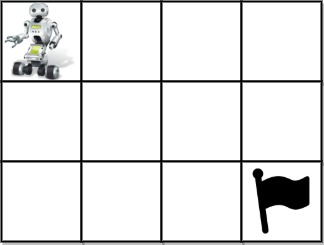Problem
You are given an m x n integer array grid where grid[i][j] could be:
1representing the starting square. There is exactly one starting square.2representing the ending square. There is exactly one ending square.0representing empty squares we can walk over.-1representing obstacles that we cannot walk over.
Return the number of 4-directional walks from the starting square to the ending square, that walk over every non-obstacle square exactly once.
Example 1:

Input: grid = [[1,0,0,0],[0,0,0,0],[0,0,2,-1]]
Output: 2
Explanation: We have the following two paths:
1. (0,0),(0,1),(0,2),(0,3),(1,3),(1,2),(1,1),(1,0),(2,0),(2,1),(2,2)
2. (0,0),(1,0),(2,0),(2,1),(1,1),(0,1),(0,2),(0,3),(1,3),(1,2),(2,2)
Example 2:

Input: grid = [[1,0,0,0],[0,0,0,0],[0,0,0,2]]
Output: 4
Explanation: We have the following four paths:
1. (0,0),(0,1),(0,2),(0,3),(1,3),(1,2),(1,1),(1,0),(2,0),(2,1),(2,2),(2,3)
2. (0,0),(0,1),(1,1),(1,0),(2,0),(2,1),(2,2),(1,2),(0,2),(0,3),(1,3),(2,3)
3. (0,0),(1,0),(2,0),(2,1),(2,2),(1,2),(1,1),(0,1),(0,2),(0,3),(1,3),(2,3)
4. (0,0),(1,0),(2,0),(2,1),(1,1),(0,1),(0,2),(0,3),(1,3),(1,2),(2,2),(2,3)
Example 3:

Input: grid = [[0,1],[2,0]]
Output: 0
Explanation: There is no path that walks over every empty square exactly once.
Note that the starting and ending square can be anywhere in the grid.
Constraints:
m == grid.lengthn == grid[i].length1 <= m, n <= 201 <= m * n <= 20-1 <= grid[i][j] <= 2There is exactly one starting cell and one ending cell.
Solution
class Solution {
private final int[] row = {0, 0, 1, -1};
private final int[] col = {1, -1, 0, 0};
private int isSafe(int[][] grid, int rows, int cols, int i, int j) {
if (i < 0 || j < 0 || i >= rows || j >= cols || grid[i][j] == -1) {
return 0;
}
if (grid[i][j] == 2) {
for (int l = 0; l < rows; l++) {
for (int m = 0; m < cols; m++) {
if (grid[l][m] == 0) {
/* Return 0 if all zeros in the path are not covered */
return 0;
}
}
}
/* Return 1, as we covered all zeros in the path */
return 1;
}
/* mark as visited */
grid[i][j] = -1;
int result = 0;
for (int k = 0; k < 4; k++) {
/* travel in all four directions (up,down,right,left) */
result = result + isSafe(grid, rows, cols, (i + row[k]), (j + col[k]));
}
/* Mark unvisited again to backtrack */
grid[i][j] = 0;
return result;
}
public int uniquePathsIII(int[][] grid) {
int rows = grid.length;
int cols = grid[0].length;
int result = 0;
for (int k = 0; k < rows; k++) {
for (int m = 0; m < cols; m++) {
if (grid[k][m] == 1) {
/* find indexes where 1 is located and start covering paths */
result = isSafe(grid, rows, cols, k, m);
break;
}
}
}
return result;
}
}
Explain:
nope.
Complexity:
- Time complexity : O(n).
- Space complexity : O(n).